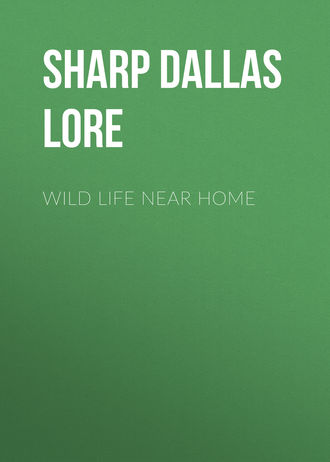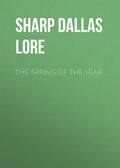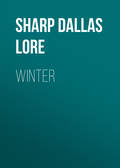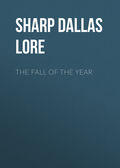
Sharp Dallas Lore
Wild Life Near Home
Having finished this first course of big-neck clams, they were joined by a third muskrat, and, together, they filed over the bank and down into the meadow. Shortly two of them returned with great mouthfuls of the mud-bleached ends of calamus-blades. Then followed the washing.
They dropped their loads upon the plank, took up the stalks, pulled the blades apart, and soused them up and down in the water, rubbing them with their paws until they were as clean and white as the whitest celery one ever ate. What a dainty picture! Two little brown creatures, humped on the edge of a plank, washing calamus in moonlit water!
One might have taken them for half-grown coons as they sat there scrubbing and munching. Had the big barred owl, from the gum-swamp down the creek, come along then, he could easily have bobbed down upon them, and might almost have carried one away without the other knowing it, so all-absorbing was the calamus-washing.
Muskrats, like coons, will wash what they eat, whether washing is needed or not. It is a necessary preliminary to dinner – their righteousness, the little Pharisees! Judging from the washing disease which ailed two tame muskrats that I knew, it is perfectly safe to say that had these found clean bread and butter upon the plank, instead of muddy calamus, they would have scoured it just the same.
Before the two on the plank had finished their meal, the third muskrat returned, dragging his load of mud and roots to the scrubbing. He was just dipping into the water when there was a terrific explosion in my ears, a roar that echoed round and round the pond. As the smoke lifted, there were no washers upon the plank; but over in the quiet water floated three long, slender tails.
"No man gwine stan' dat shot, boy, jis t' see a mus'rat wash hi' supper"; and Uncle Jethro limbered his stiffened knees and went chuckling down the bank.
A STUDY IN BIRD MORALS
The eternal distinctions of right and wrong upon which the moral law is based inhere even in the jelly of the amœba. The Decalogue binds all the way down. In the course of a little observation one must find how faithfully the animals, as a whole, keep the law, and how sadly, at times, certain of them are wont to break it.
To pass over such notorious cases as the cow-bird, cuckoo, turkey-buzzard, and crow, there is still cause for positive alarm, if the birds have souls, in the depraved habit of duplicity common among them. In a single short tramp, one June afternoon, no less than five different birds attempted to deceive me. The casuist may be able to justify all five of them; for, no doubt, there are extremities when this breach of the law should not merit condemnation; but even so, if in the limits of one short walk five little innocents deliberately act out the coolest of falsehoods, one cannot help wondering if it is not true that the whole creation needs redeeming.
The first of these five was a yellow warbler. I was trying to look into her nest, which was placed in the top of a clump of alders in a muddy pasture, when she slipped out and fluttered like an autumn leaf to the ground. She made no outcry, but wavered down to my feet with quivering wings, and dragged herself over the water and mud as if wounded. I paused to look at her, and, as long as I watched, she played her best to lure me. A black-snake would have struck at her instantly; but I knew her woman's ways and turned again to the nest. As soon as she saw that her tears and prayers would not avail; she darted into the bushes near me and called me every wicked thing that she could think of. I deserved it all, of course, though I was only curious to see her cradle and its holdings, which, had she been a human mother, she would have insisted on my stopping to see.
On the way to Lupton's I climbed a sharp, pine-covered hill, where the needles were so slippery that I had to halt for a minute's rest at the top. The trees rose straight and close and slender, with scarcely a live branch reaching out nearer the ground than twenty feet. The roof of green shut out the light, and the matting of brown spread the ground so deep that only a few stunted blueberry-bushes, small ferns, and straying runners of ground-pine abode there. It was one of those cathedral-like clumps, a holy of holies of the woods, into whose dim silence the straggling bushes, briers, and other lowly forest folk dare not come, but fall upon their knees outside and worship.
The birds, however, are not so reverent. I was scarcely stretched upon the needles when a slight movement overhead arrested my attention. As I looked, a soft fluttering of wings brought a blue jay into the branches directly above me. There is nothing peculiar in finding a blue jay among the pines – they usually nest there. But there was something peculiar about this jay; he moved so quietly, he appeared so entirely unconscious of me, though I knew that he saw me as plainly as I him. Then at his side alighted his mate, meeker and more modest than a chippy.
What did it signify – these squawking, scolding, garrulous birds suddenly gone silent and trustful? In the pines at this season one never gets nearer a jay than field-glass range – near enough to hear him dash away, screeching defiance. But here were these two gliding among the branches above my head as cautiously and softly as cuckoos, searching apparently for grubs, yet keeping all the time to the one spot, not leaving for a moment to hunt among other trees. Round and round the same limbs they went, without once screaming or uttering so much as a word of that sweet, confiding talk which one hears when he spies on a pair of lovers or a newly wedded couple of these birds. I became suspicious. All this meant something. They kept close together, and fluttered about, hanging from the twigs head down like chickadees, deliberately biting off bunches of needles, prying into the cones, and scaling off bits of bark, but finding nothing, nor even trying to find anything.
At this juncture I chanced to move my feet. The birds stopped instantly; but on my becoming quiet they went on scattering the needles and bark-chips again. Then I raised my glass. They paused just for a second, and continued, though now I saw that their picking was all at random, hitting the limb or not as might be. They were not hunting grubs: they were watching me; and more – they were keeping me watching them.
It was a clever little ruse. But it was too good, too new, too unjaylike for my faith. There was a nest against one of these pines, as sure as it was June. And this fearless unconcern? this new and absorbing interest in grubs? All assumed! – very genuinely assumed, indeed, and might have led me to do a dozen things other than looking for the nest, had I known a little less of jays. It was heroic, too. They were calm and had all their wits about them. Outwardly they were indifferent to my presence and gave me not the slightest heed. But this was all show. Every instant they saw me; and, while pretending not to know that I was near, they had come to intercept me, to attract my attention to themselves, and save their nest. And at how much cost! To have looked within those calm little bosoms were to have seen two hearts as anxious and fearful as ever thumped parental breasts.
If I had been deceived and led to waste my afternoon or to record something untrue of the blue jay, still, I think, these two birds could hardly have been condemned before the law. For did not their motive justify the deed?
The blue jays are braggarts, full of noise, and almost without morals; yet they have not seemed to me quite as bad as they used to, not quite the same blustering, quarrelsome, unmoral renegades, since these two showed me how they could conquer their instinctive fears and rise superior to everything common and cowardly by the power of their parental love.
I could not find the nest; so returning the next day, I crept under cover to the foot of the hill, and, ascending stealthily, saw the hen as she slipped from the home tree. She melted away among the dark pines like a shadow, but reappeared immediately with her mate to head me off again. Not this time, however, for I had their secret. My eye was upon the nest. It was a loose, rough affair of coarse sticks, fixed upon two dead branches well up against a slender pine's trunk. I could see patches of light sky through it, it was such a botch. But where art failed nature perfected. I saw the sky through the bungled structure, but not the eggs. I had to climb to see them, for they were so washed with shadowy green that they blended perfectly with the color of the nest and the subdued light of the pines.
After my adventure with the jays I had an interesting experience with a pair of tiny birds in the sand-bank on the north side of Lupton's Pond.
The country immediately surrounding the pond is exceedingly varied and full of life. The high, level farm-lands break off into sandbanks, which, in turn, spread into sweeping meadows that run out to the creek. The little pond lies between steep hills of chestnut-oak and pine, its upper waters being lost in a dense swamp of magnolia and alder, while over the dam at its foot there rushes a fall that echoes around the wooded hills and then goes purling among the elder and dog roses into the sullen tide-ditches of the meadow. Except the meadows and cultivated fields, everything is on a small scale, as if the place were made of the odds and ends, the left-over pieces in the making of the region round about. Such diversity of soils, such a medley of features, such profusion of life, in a territory of the same size I never saw elsewhere. At the boarding-school, near by, Lupton's Pond is known as "Paradise."
On reaching the pond I went over to the sand-bank to look for a pair of kingfishers who had nested there many years; but instead of them, I saw a pair of winter wrens fly sharply among the washed-out roots of a persimmon-tree which stood on the edge of the hill above. I instantly lost sight of one of the birds. The actions of the other were so self-conscious that I stopped and watched – I had never found a winter wren's nest. In a moment the missing bird appeared and revealed the nest. It was large for the size of the builders, made of sticks, grass, and feathers, and was fixed among the black roots just below the green hilltop, and set into the sand far enough to leave a little of one side exposed.
The wrens hurried away on my approach; but when I retreated to the foot of the bank, they darted back to the nest, the hen entering without a pause, while the cock perched upon a root at the door and began a most extraordinary performance.
He managed to put himself directly between me and the tiny portal, completely cutting off my view of the little brown wife inside the nest; then, spreading his wings, with tail up and head on one side, he fluttered and bobbed and wagged and poured out a volume of song that was prodigious. It lifted him fairly off his feet. Had he suddenly gone up with a whizz, like a sky-rocket, and burst into a shower of bubbles, trills, runs, and wild, ecstatic warbles, I should have looked on with no more wonder. Such a song! It was singing gone mad.
My head was on a level with him. I leaned forward nearer the bank. At this he went crazy with his efforts – into a fit, almost. I cannot have been mistaken: it was the first time that I had ever heard a bird sing when in terror; but I had whistled my way past too many dogs and through too many graveyards at night to be deceived in the note of fear, and in the purpose of this song. That bit of a husband was scared almost out of his senses; but there he stood, squarely between me and that precious nest and the more precious wife, guarding them from my evil eyes with every atom of his midget self.
It was as fine an illustration of courage as I ever saw, a triumph of love and duty over fear – fear that perhaps we have no way to measure. And it was a triumph of wedded love at that; for there were no young, not even an egg in the unfinished nest. It all happened in less than a minute. The female reappeared in an instant, satisfied that all was well with the nest, and both birds sped off and dropped among the briers.
How would the casuist decide for so sweet, so big, so heroic a deception – or the attempt?
A little farther down the creek, where the meadows meet the marsh, dwell the cousins of the winter wrens, the long-billed marsh-wrens. Here in the wide reaches of calamus and reeds, where the brackish tide comes in, the marsh-wrens build by hundreds. Their big, bulky nests are woven about a handful of young calamus-blades, or tied to a few long, stout sedge-stalks, and grow as the season grows.
The nests are made of coarse marsh-grass, – of the floatage often, – and are so long in the process of construction that, when completed, they are all speared through with the grass-blades, as with so many green bayonets. They are about the size of a large calabash, nearly round, thick-walled and heavy, with a small entrance, just under the roof, leading upward like a short stair to a deep, pocket-like cavity, at whose bottom lie the eggs, barely out of finger reach.
I could hear the smothered racket of the singing wrens all about me in the dense growth, scoldings to my right, defiance to my left, discussions of wives, grumblings of husbands, and singing of lovers everywhere, until the whole marsh seemed a-sputter and a-bubble with a gurgling tide of song like a river running in. Now and then, a wave, rising higher than its fellows, splashed up above the reeds and broke into song-spray, as an ecstasy lifted the wee brown performer out of the green.
But these short dashes of the wrens into upper air, I have come to believe, are not entirely the flights of enraptured souls. Something more than Mr. Chapman's "mine of music bursts within them." Before they knew that I was near I rarely saw one make this singing dive into the air; but as soon as they were acquainted with my presence they appeared on every hand. I had not gone fifty feet into their reedy domain when I began to catch a furious berating. The knives of the mowing-machine up in the meadow went no faster nor sharper than these unseen tongues in the reeds. Suddenly a bit of brown fury dashed into view near me, spattered the air thick with song-notes, and, as if veiled by this cloud of melody, it turned on its head and dived back, chattering of all that was seen to the other furies in the reeds.
Does any one believe that exhibition to be an explosion of pure song – the exaltation of unmixed joy? If ever the Ninth Commandment was broken, it was broken here.
This uncontrollable emotion, this shower of song, is but a cloak to the singer's fear and curiosity. He wants to know where I am and what I am about. I once knew a little dog who was so afraid of the dark that he would run barking all the way to the barn when put out at night. So these little spies start up singing their biggest as a blind to their real feelings and purposes.
The quail's broken wings and rushes of blood to the head during nesting-time have lost their lure even for the small boy; yet they somehow still work on me. I involuntarily give my attention to this distress until too late to catch sight of the scurrying brood. I imagine, too, that the oldest and wisest of the foxes is still fooled by this make-believe, and will continue to be fooled to the end of time.
A barren, stony hillside slopes gradually to the marsh where the wrens live. Here I was met by the fifth deceiver, a killdeer plover. The killdeer's crocodile tears are bigger and more touchingly genuine than even the quail's. And, besides all her tricks, she has a voice that fairly drips woe.
The killdeer always builds in a worn-out, pebbly pasture or in a bare, unused field. Here among the stones she makes her nest by scraping out a shallow cavity, into which she scratches a few bits of rotten wood and weed-stalks in sizes that would make good timber for a caddis-worm's house. Instead of digging the cavity, she often hunts up two or three stones and a corn-butt, which happen to lie so that she can crowd in between them, and makes this shift serve her for a nest.
Her eggs are one of the world's small wonders. They lie out in the open like so many of the pebbles about them – resembling the stones so perfectly that they are more often overlooked or crushed than discovered. The ground color of the egg is that of the earth, and the markings correspond marvelously to the size, shade, and distribution of the bits of wood beneath them in the nest. I know of no other instance of protective coloring among the birds so nearly perfect, unless it be the killdeer herself when playing her favorite trick of "invisible."
She had seen me before I entered the reeds of the marsh-wrens. Squatting close over her eggs, she watched me silently, and seeing that I was approaching her nest on my way up the hill, she glided off and suddenly appeared at my feet. Where she came from I did not know. It was as if the earth had opened and let her out. I stopped. That was what she wanted. "You numskull, look at me and make a fool of yourself," she said by the light in her eye. I did exactly so.
With her head outstretched and body close to the ground, she slid like a ghost before me as I followed. Now she took form like a stone, now seemed to sink out of sight into the earth, reappearing only to vanish again into thin air. Thus she led me on, contriving to keep from beneath my feet, and always just out of reach, till, seeing that my credulity and patience were failing, she broke silence for a desperate last act, and fell in a fit, screaming, Kill-dee, kill-dee, kill-dee!
There she lay in the agony of death. I stooped to pick her up; but she happened to flutter a little – the death-spasm. I stepped forward to take her. Putting my hand down, I – ah! not dead yet! Poor thing! She jerked just out of my hand – reflex action, no doubt. But now it is all over; she is dead, and I bend to pick her up, when, springing like an arrow from my grasp, killdeer, ringing out her wail, goes swiftly flying across the hill.
Fooled! Yes; but not altogether fooled, for I knew that it would turn out so. The impostor! But wasn't it beautifully done? I shall never grow too wise to be duped.
She has played me a trick, and now I will revenge myself and find her nest. I shall – perhaps.
RABBIT ROADS
In your woods walks did you ever notice a little furrow or tunnel through the underbrush, a tiny roadway in the briers and huckleberry-bushes? Did you ever try to follow this path to its beginning or end, wondering who traveled it? You have, doubtless. But the woods must be wild and the undergrowth thick and you must be as much at home among the trees as you are in your own dooryard, else this slight mark will make no impression upon you.
But enter any wild tract of wood or high swamp along the creek, and look sharp as you cut across the undergrowth. You will not go far before finding a narrow runway under your feet. It is about five inches wide, leading in no particular direction, and is evidently made by cutting off the small stems of vines and bushes at an inch or more from the ground. The work looks as if it had been laid out by rule and done with a sharp knife, it is so regular and clean.
This is a rabbit road. Follow it a few rods and you will find it crossed by another road, exactly similar. Take this new path now, and soon you are branching off, turning, and joining other roads. You are in rabbit-land, traveling its highways – the most complicated and entangling system of thoroughfares that was ever constructed. The individual roads are straight and plain enough, but at a glance one can see that the plan of the system is intended to bewilder and lead astray all who trespass here. Without a map and directions no one could hope to arrive at any definite point through such a snarl.
There often comes along with the circus a building called the "Moorish Maze," over whose entrance is this invitation:
COME IN AND GET LOST!
This is what one reads at the cross-roads in rabbit-land. There are finger-boards and mile-stones along the way; but they point nowhere and mark no distances except to the rabbits.
An animal's strong points usually supplement each other; its well-developed powers are in line with its needs and mode of life. So, by the very demands of his peculiar life, the beaver has become chief among all the animal engineers, his specialty being dams. He can make a good slide for logging, but of the construction of speedways he knows absolutely nothing. The rabbit, on the other hand, is a runner. He can swim if he is obliged to. His interests, however, lie mostly in his heels, and hence in his highways. So Bunny has become an expert road-maker. He cannot build a house, nor dig even a respectable den; he is unable to climb, and his face is too flat for hole-gnawing: but turn him loose in a brambly, briery wilderness, and he will soon thread the trackless waste with a network of roads, and lay it open to his nimble feet as the sky lies open to the swallow's wings.
But how maddening these roads are to the dogs and foxes! In the first place, they have a peculiar way of beginning nowhere in particular, and of vanishing all at once, in the same blind fashion. I am not sure that I ever found a satisfactory end to a rabbit's road – that is, a nest, a playground, or even a feeding-place. Old Calamity, the hound, is always tormented and undone whenever she runs foul of a rabbit road.
She will start Bunny in the open field, and trail away after him in full tongue as fast as her fat bow-legs will carry her. The rabbit makes for the woods. Calamity is hot on his track, going down toward the creek. Suddenly she finds herself plunging along a rabbit road, breaking her way through by sheer force where the rabbit slipped along with perfect ease. She is following the path now rather than the scent, and, all at once, discovers that she is off the trail. She turns and goes back. Yes, here the rabbit made a sharp break to the right by a side-path; the track is fresh and warm, and the old hound sings in her eager delight. On she goes with more haste, running the path again instead of the trail, and – there is no path! It is gone. This bothers the old dog; but her nose is keen and she has picked up the course again. Here it goes into another road. She gives tongue again, and rushes on, when —Wow! she has plunged into a thick and thorny tangle of greenbrier.
That is where the torment comes in. These roads have a habit of taking in the brier-patches. Calamity will go round a patch if she can; she will work her way through if she must – but it is at the cost of bloody ears and a thousand smarting pricks. Bunny, meantime, is watching just inside the next brier-patch, counting the digs of his clumsy pursuer.
I suppose that this "blind alley" kind of road is due to the fact that the rabbits have no regular homes. They make a nest for the young; but they never have dens, like minks and coons. In New England they often live in holes and among the crannies of the stone walls; and there, as far as I have seen, they rarely or never make roads. Farther south, where the winters are less severe, they dig no holes, for they prefer an open, even an exposed, bed to any sort of shelter.
Shelters are dangerous. Bunny cannot back into a burrow and bare his teeth to his enemy; he is not a fighter. He can run, and he knows it; legs are his salvation, and he must have room to limber them. If he has to fight, then give him the open, not a hole; for it is to be a kangaroo kicking match, and a large ring is needed. He had as well surrender himself at once as to run into a hole that has only one opening.
During the cold, snowy weather the rabbits usually leave the bare fields for the woods, though the older and wiser ones more frequently suffer the storms than risk the greater danger of such a move. When pressed by hunger or hounded hard, they often take to a rail-pile, and sometimes they grow so bold as to seek hiding under a barn or house. One young buck lived all winter in the wood-pile of one of my neighbors, becoming so tame that he fed with the chickens.
The nearest approach that a rabbit makes to a house is his "squat," or form. This is simply a sitting-place in the fields or along the woods, that he will change every time he is thoroughly frightened out of it. Undisturbed he will stay in this squat for months at a time. Occasionally a rabbit will have two or three squats located over his range, each one so placed that a wide view on every side may be had. If it is along the woods, then he sits facing the open fields, with his ears laid back toward the trees. He can hear as far as he can see, and his nose tells him who is coming up the wind sooner than either eyes or ears.
It is cold, lonely living here in the winter. But everybody, except the mice and little birds, are enemies, his only friends being his wits and legs. In the long run, wits and legs are pretty safe insurance. "He who fights and runs away will live to fight another day," is Bunny's precept – and it works well; he still thrives.
The squat is a cold place. The sky is its roof, and its only protection is the tuft of grass, the stone, or the stump beside which it is placed. Bunny may change to the lee or windward side, as suits him, during a storm; but usually he keeps his place and lies close to the ground, no matter how the wind blows, or how fiercely falls the rain and snow. I have frequently started them from their squats in bleak, wind-swept fields, when the little brown things were completely snowed under.
There is great individuality among all animals, and though the rabbits look as much alike as peas, they are no exception to the rule. This personality is especially shown in their whimsical fancies for certain squats. Here, within sight of the house and the dog, an old rabbit took up her abode on a big, flat rail in the corner of the fence. Of course no hawk or owl could touch her here, for they dared not swoop between the rails; the dog and cat could scent her, but she had already whipped the cat, and she had given Calamity so many long runs that the hound was weary of her. The strategic value of such a situation is plain: she was thus raised just above the level of the field and commanded every approach. Perhaps it was not whim, but wisdom, that led to this selection.
I knew another, a dwarf rabbit, that always got into a bare or plowed field and squatted beside a brown stone or clod of earth. Experience had taught him that he looked like a clod, and that no enemy ever plagued him when he lay low in the brown soil.
One summer I stumbled upon a squat close along the public road. Cart-loads of trash had been dumped there, and among the debris was a bottomless coal-scuttle. In the coal-scuttle a rabbit made his squat. Being open at both ends, it sheltered him beautifully from sun and rain. Here he sat, napping through the day, watching the interesting stream of passers-by, himself hidden by the rank weeds and grass. When discovered by a dog or boy, he tripped out of one of his open doors and led the intruder a useless run into the swamp.
At one time my home was separated from the woods by only a clover-field. This clover-field was a favorite feeding-ground for the rabbits of the vicinity. Here, in the early evening, they would gather to feed and frolic; and, not content with clover, they sometimes went into the garden for a dessert of growing corn and young cabbage.
Take a moonlight night in autumn and hide in the edge of these woods. There is to be a rabbit party in the clover-field. The grass has long been cut and the field is clean and shining; but still there is plenty to eat. The rabbits from both sides of the woods are coming. The full moon rises above the trees, and the cottontails start over. Now, of course, they use the paths which they cut so carefully the longest possible way round. They hop leisurely along, stopping now and then to nibble the sassafras bark or to get a bite of wintergreen, even quitting the path, here and there, for a berry or a bunch of sweet wood-grass.
"Stop a moment; this won't do! Here is a side-path where the briers have grown three inches since they were last cut off. This path must be cleared out at once," and the old buck falls to cutting. By the time he has finished the path a dozen rabbits have assembled in the clover-field. When he appears there is a thump, and all look up; some one runs to greet the new-comer; they touch whiskers and smell, then turn to their eating.
The feast is finished, and the games are on. Four or five of the rabbits have come together for a turn at hop-skip-and-jump. And such hop-skip-and-jump! They are professionals at this sport, every one of them. There is not a rabbit in the game that cannot leap five times higher than he can reach on his tiptoes, and hop a clean ten feet.
The fox is feared; but then, he is on legs, not wings, and there are telltale winds that fly before him, far ahead, whispering, Fox, fox, fox! The owl, remember, like the wind, has wings – wings that are faster than the wind's, and the latter cannot get ahead to tell of his coming. Reynard is cunning. Bunny is fore-sighted, wide awake, and fleet of foot. Sometimes he is caught napping – so are we all; but if in wits he is not always Reynard's equal, in speed he holds his own very well with his enemy. Reynard is nimble, but give the little cottontail a few feet handicap in a race for life, and he stands a fair chance of escape, especially in the summer woods.
When the hounds are on his trail the rabbit saves his legs by outwitting his pursuers. He will win a long distance ahead of them, and before they overtake him he will double on his track, approaching as near as he dare to the dogs, then leap far aside upon a log, into a stream, or among the bushes, and strike out in a new direction, gradually making back toward the starting-place. He rises on his haunches to listen, as he goes along, and before the dogs have again picked up the trail, he has perhaps had time to rest and lunch.







